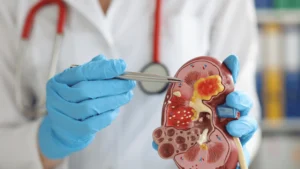Introduction
Kidney cancer, also known as renal cell carcinoma, is one of the most common types of cancer, with nephrectomy or kidney removal being the standard treatment for localized disease. However, even after the successful removal of the affected kidney, there is a risk of kidney cancer recurrence. Understanding the likelihood of recurrence, as well as the risk factors and ways to reduce the risk, is crucial in providing the best possible care for patients. In this article, we will delve into these important aspects and discuss the importance of regular monitoring and recognizing potential symptoms.

Recurrence Likelihood
The likelihood of kidney cancer recurrence after nephrectomy varies depending on individual circumstances. Generally, the risk of recurrence is higher for patients with larger tumors, high-grade tumors, positive lymph node involvement, or metastasis at the time of diagnosis. Approximately 30% of patients experience a recurrence within five years after nephrectomy. However, it is important to note that each patient is unique, and the recurrence risk will be evaluated based on their specific characteristics.
Risk Factors
Several risk factors can increase the likelihood of kidney cancer recurrence. These include smoking, obesity, high blood pressure, and a family history of the disease. Additionally, the subtype of kidney cancer can also affect the risk. Patients with clear cell renal cell carcinoma generally have a higher likelihood of recurrence compared to those with other subtypes. The presence of certain genetic syndromes such as von Hippel-Lindau disease or hereditary leiomyomatosis and renal cell cancer syndrome also increases the risk of recurrence.
Reducing the Risk
While complete prevention of kidney cancer recurrence is not always possible, there are steps that can be taken to reduce the risk. Firstly, leading a healthy lifestyle is crucial. This includes quitting smoking, maintaining a healthy weight, and managing blood pressure. Regular exercise and a balanced diet can also contribute to overall well-being. Additionally, taking prescribed medications to control hypertension and other risk factors is essential. In certain cases, targeted therapies or immunotherapies may be recommended to decrease the risk of recurrence.
Monitoring
Regular monitoring is essential to detect any signs of kidney cancer recurrence. After nephrectomy, patients are advised to undergo frequent follow-up visits with their healthcare provider. These visits typically include physical examinations, blood tests, and imaging scans such as chest X-rays, computed tomography (CT) scans, or magnetic resonance imaging (MRI) scans. The frequency and duration of monitoring depend on the individual’s risk profile and the presence of any ongoing treatment. It is important to attend all scheduled appointments and promptly report any concerning symptoms.
Symptoms
Recognizing the potential symptoms of kidney cancer recurrence is vital for early detection and intervention. Some of the common signs include blood in the urine, unexplained weight loss, persistent pain in the back or side, fatigue, and generalized or recurrent infections. However, it is essential to remember that these symptoms can also be indicative of other conditions. If any of these signs persist or worsen, it is crucial to consult a healthcare professional for proper evaluation and diagnosis.
FAQs
Q: Can kidney cancer recurrence be completely prevented after nephrectomy?
A: While complete prevention is not always possible, taking certain measures such as leading a healthy lifestyle, managing risk factors, and undergoing regular monitoring can significantly reduce the risk of recurrence.
Q: How often should I have follow-up visits after nephrectomy?
A: The frequency of follow-up visits depends on individual risk factors and ongoing treatment. Generally, follow-up visits are scheduled every three to six months for the first two years, then annually afterward.
Q: Are there any alternative treatment options if kidney cancer recurs?
A: Depending on the specific characteristics of the recurrence, options such as additional surgery, targeted therapies, immunotherapies, or clinical trials may be considered. Your healthcare provider will determine the most appropriate treatment approach based on your individual circumstances.
Summary
After nephrectomy, there remains a risk of kidney cancer recurrence, although the likelihood varies depending on individual factors. Risk factors such as tumor size, grade, lymph node involvement, and metastasis play a crucial role. However, steps can be taken to reduce the risk, including leading a healthy lifestyle, managing risk factors, and considering targeted or immunotherapies. Regular monitoring and recognizing potential symptoms are also essential for early detection and timely intervention. By understanding these aspects, patients and healthcare providers can work together to optimize patient outcomes and provide the best possible care.